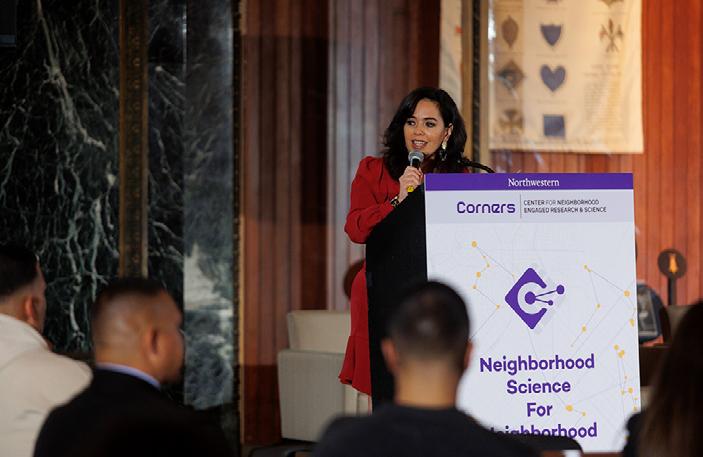
3 minute read
‘Puncturing’ the Narrative of Racial Progress
Distinguished social psychologist reveals how Americans overestimate advances in racial equality
The abolition of slavery, repeal of Jim Crow laws, and election of the first Black president bolster a narrative of progress toward racial equality that Americans want to believe in.
Advertisement
Yet in her IPR Distinguished Public Policy Lecture on May 9, Yale social psychologist Jennifer Richeson discussed her research examining how this myth of linear, natural, automatic racial progress over time in the United States distorts our perceptions and influences our expectations.
Richeson, who serves on President Joe Biden’s President’s Council of Advisors on Science and Technology, has received many accolades for her groundbreaking research investigating the psychological phenomena of cultural diversity, including a prestigious MacArthur “Genius” Fellowship that she received when she was a faculty member at Northwestern and IPR.
In pursuing her discussion of the “mythology,” Richeson points to Americans’ belief that as a country, racial equality is automatically getting better in a largely linear fashion over time. While American society acknowledges the periods of history that blemish that timeline, such as slavery and Jim Crow laws, it also continues to embrace a belief that, with a few corrective measures, the country gets back on track and racial progress begins to unfold naturally yet again.
“This mythology, we argue, is not only operating, but it has some important implications including how and to what degree we perceive racial equality or inequality,” she said. If racial inequality is not perceived accurately, she continues, then it cannot be adequately rectified.
The Misplaced Optimism over Progress
Richeson uses lab experiments, surveys, and other tools to understand the psychological and cognitive processes underlying Americans’ misbeliefs and misplaced optimism regarding racial progress.
In a 2019 study, she finds that Americans, especially wealthy Whites, vastly overestimate progress towards racial economic equality. Richeson shows that, overwhelmingly, Americans falsely believe we have achieved considerable racial wealth equality: Participants thought that Black families in 1963 had just less than half of the wealth of White families, but that Black wealth had climbed all the way up to 90% of that of Whites by 2016.
These estimates are “wildly inaccurate,” Richeson says, and feed into the myth that the passage of time equals progress. According to federal data, a Black family had little more than $5 for every $100 of wealth accumulated by a White family in 1963, and that had only nudged up to $10 for every $100 by 2016, or just 10% of Whites’ family wealth.
To better understand the psychological underpinnings of the racial progress narrative, Richeson suggests that in encountering such questions, people tend to think about some of the nation’s most successful Black Americans— think, the Obamas, LeBron James, or Oprah Winfrey—people who are hardly representative of ordinary Black people.
She and her colleagues conducted a study where they examined exactly that, finding that when presented with images of the top five Black American billionaires participants overestimate racial wealth equality more than when they are presented with images of America’s top five billionaires overall (all White men). Richeson argues that these results suggest that the latter images undermine participants’ tendency to think high wealth Black Americans just before they make their estimates of racial wealth equality.
Shaping Expectations for the Future
Americans still live in “incredibly segregated spaces,” Richeson explains, which contributes to a simple lack of information about people outside of your community.
Richeson also points to possible psychological explanations—a steadfast belief in a “just world” and faith in the “American dream”— which perpetuate the idea that anyone can achieve success just by working hard and dismiss the existence of systemic barriers facing minorities.
Richeson adds that it is not that the belief in the possibility of progress is bad, but it is “when we blind ourselves to reality in favor of mythology.”
The focus on the policy wins of the past that have led to increased racial equality can shield us from perceiving major current inequities, like the drastic inequality in school funding between Black and White areas.
The United States has made progress towards equality, Richeson acknowledges, but it still has a long way to go. Disrupting the narrative is not enough, she says, because of the strong determination of the American people to believe their country is progressing towards equality. The country needs a dose of reality, plus possibility, to make true progress, Richeson explains, quoting former President Obama: “The arc of the moral universe may bend toward justice, but it doesn’t bend on its own.”










